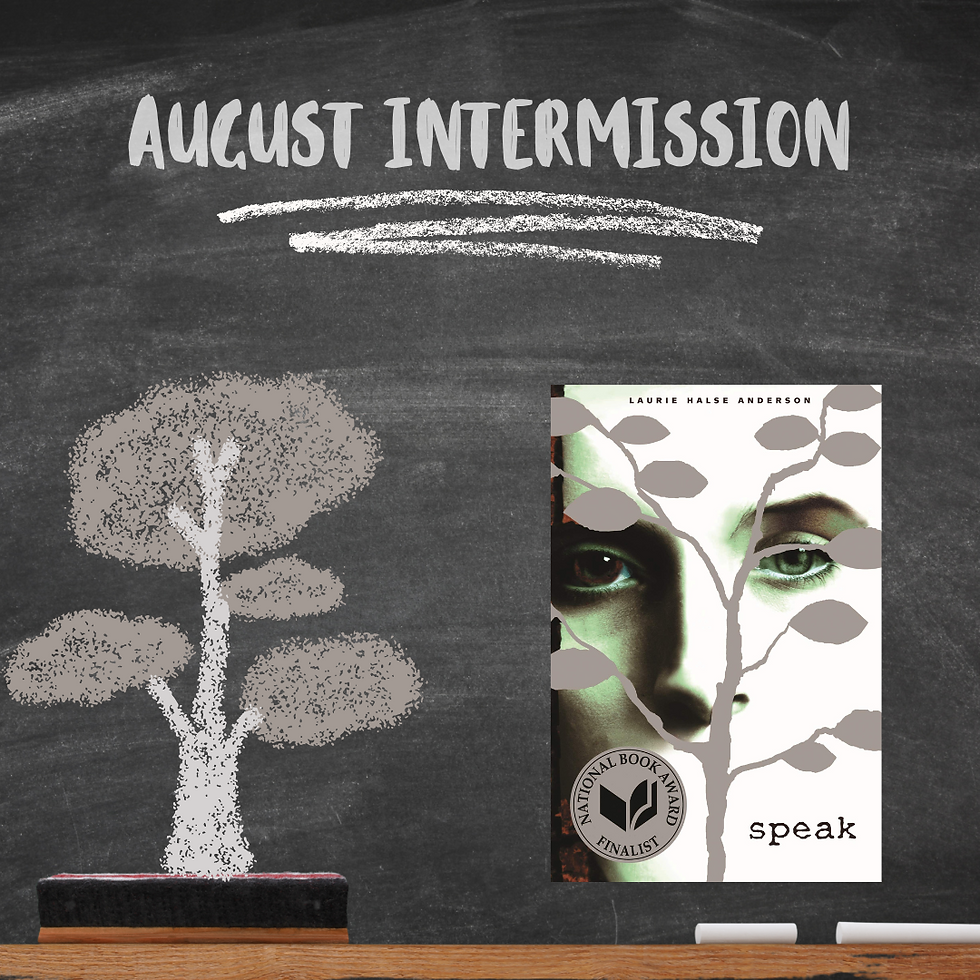August Intermission: Speak - Laurie Halse Anderson
- Brieanna Ceraya Haberling Nichols
- Aug 6, 2025
- 4 min read
Updated: Aug 16, 2025

Hi there!
Welcome to our August 2025 Intermission for Laurie Halse Anderson's 1999 novel Speak.
Trigger Warning: Self-Harm, Sexual Assault, Suicidal Ideation, High School Drama, Emotionally Unintelligent Parents
Overall
Pleasantly surprised by how much we love this book already - when we first looked up this book, we thought it was going to be pretentious in some way. And yet, after we started reading it, we were so happy to report that it's very relatable, realistic, funny, as well as endearing and shocking.
Melinda
She masks so well, which is wild because she's so young. And then when she has a traumatic flashback that shocks her and brings her back to her trauma, we're shocked right along with her.
We feel that Melinda chooses her silence because she is fearful of the consequences. She's already worried about what her friends and parents think of her for something more minor, so what will they think of her when she tells the FULL truth? She may be trying to put it behind her in some way as well. Does Melinda WANT the world to know what happened? Would SHE rather keep it to herself? Is that the SAFER option in the society she was born into?
We noticed in the first half of the book that she barely speaks. We believe this is a reflection of how she may see herself, and the author's choice of words is extremely unique. Especially in the frog-dissection scene. The author chooses to personify the frog in Melinda's mind, and somehow, at the same time, Melinda is seeing the frog as better off than herself. Melinda, at least in part one, has allowed her perception of self to become warped.
The School
The school is a fascinating setting in this story. Melinda feels invisible because her friends have found new cliques, and Melinda has been renovating an old closet in the school in order to somehow have power over something. This is the space where she can just do whatever she wants to change it up and make it her own, that is completely customized to her likes, and will, maybe by the end of the school year, it will SCREAM "MELINDA!!!"
A gym teacher has seen her talents in basketball, and then she has also had others notice her talents in art. In one way, the school is fostering her talents and affirming her abilities just as an individual. That being said, she is still surrounded by a social scene that is ostracizing her and pressuring her in different ways.
As an environment for Melinda's story, it's quite interesting. Some characters are using her skills and abilities for their gain instead of fostering a relationship with her, which can be damaging. She said she didn't want to do something (basketball, the posters, etc), and then instead of respecting Melinda's "NO," she was used and tossed aside.
We think that Mr. Freeman is one of the better characters in the book. He's more relatable to Melinda because not only does he meet her where she's at, but he also offers her different ways to communicate rather than speaking. He offers the visual medium to her to communicate with so that the interpretation can be indirect, and not a direct exposure of her feelings. Instead of asking her to clearly state exactly what happened to her, Mr. Freeman is instead asking her to connect with the tree (the object she chose) and find her way through the process herself.
We think that Heather is a sweet friend to Melinda for now, but we need to learn more about her to say whether or not she's worth our attention. We think it's a little weird that Heather is trying to get in with the Marthas, but you do you, I guess.
Feminine Rage?
One of the definitions of Feminine Rage is that it isn't loud or violent - we just feel it quite intensely inside. In this first half of the book, though, Melinda is actively avoiding her rage, because she doesn't want to deal with it at this time and/or she is fearful of the consequences if she DOES choose to speak up at this time.
We would also say that her choosing to self-harm in the first half of the book is one of the only two ways that she expresses any rage at all, alongside her art.
The Writing Style
We LOVE the style of writing in this book. The way the author interprets the scene in which Melinda is having a conversation with her parents during "Dinner Theater" becomes a play script that has stage directions for all of the characters. That is SO CLEVER because it describes how things feel to Melinda - literally DINNER AND A SHOW.
Another note about the writing style in this book is how conversational it is. Despite this book being almost entirely in Melinda's head, it feels very much like a friend talking to me about her day. This is her diary. WE are her diary. Instead of writing it down literally in the book, Melinda thinks it, and we hear it.
Conclusion
Thoughts moving forward? We want to know what happened at the party, and we want to know why her friends are all gone (was it because of what happened at the party?) David Petrakis seems cool, so we agree that good things should happen with him, whatever they are. We hope that good things happen with her parents and that they improve. And we're quite worried about Mr. Freeman. Hoping he stays hired.
You are heard. If you or anyone you know is struggling with abuse or thoughts of self-harm, please reach out to your local resources or visit this link:
With love, see you soon!
Ceraya & Brieanna






Comments